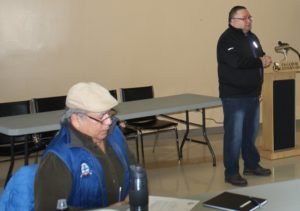TEK Elders continue their efforts in fight against government aerial spraying

By Leslie Knibbs
SAGAMOK ANISHNAWBEK FIRST NATION—Chief Paul Eshkakogan of Sagamok First Nation told those attending a February 16 meeting in Sagamok that he and many of his colleagues from the 21 First Nations included in the Robinson Huron Treaty of 1850 are in full support of Traditional Ecological Knowledge (TEK) in their efforts to put a stop to aerial spraying.
Not happy with the lack of government consultation with the Elders, Eshkakogan referred to the government’s lack of response to TEK Elders’ many requests for consultation.
“They don’t listen, when governments are not listening, then you are going to hear the wrath of our Elders,” stated Eshkakogan. “The spraying program will probably start in July, so we have a number of things we can accomplish before then; we have to let everything awaken in Spring.”
The Chief recommended a strategy be formed leading to assembling a team.
“[The assembled team should] go out there and look at each of these blocks,” stated Chief Eshkakogan referring to the spraying areas in the forests of all 21 First Nations.
Elder and former Chief, Art Petahtegoose of Atikameksheng Anishnawbek, White Fish Lake First Nation, has been a member of TEK since its inception. Petahtegoose echoed the Elders’ position on aerial spraying.
“We want to hold Ontario and Canada to account for spreading this contaminant around our ‘kitchen’. We’re going to sit down and remind them of their obligations,” stated Petahtegoose, adding that we have a responsibility for the children and future generations and caring for Mother Earth. “My mother takes care of me.”
Sagamok Lands and Resource Director Ross Assinewe addressed the congregation.
“It’s not just the forestry industry, but [we] must look at others,” stated Assinewe. “When we talk about a course of action, we have to look at who we are going to talk to.”
Assinewe referred to the corridors of hydro towers in the forest.
Elder Raymond Owl from Sagamok put forward the idea of holding a demonstration at Queen’s Park in the Spring. Chief Eshkakogan said,
“Demonstrations are good, they get the message out, but they have to be used at the right time,” stated Chief Eshkakogan in response to Elder Owl’s idea.
With no response coming from Health Canada regarding the Elders’ demands to stop aerial spraying, the focus for TEK has now shifted to the province. At this time, the province of Quebec is the only province to ban aerial spraying.
In a letter addressed to Kathryn McGarry, Minister of Natural Resources and Forestry, dated February 9, Algoma-Manitoulin MPP Michael Mantha responded in support for TEK.
“It would seem that both the Ontario Ministry of Natural Resources and Forestry as well as officials of Health Canada [have] not grasped the point that the TEK Elders believe their Aboriginal rights and treaty rights have not been respected,” stated Mantha. “Specifically, there has been no consultation from either Federal or Provincial government levels on such practices.”
TEK Elder Raymond Owl believes there has been no consultation on aerial spraying since it started in the 70s.
“There has been no consultation with the affected Indigenous people to learn what scientific perspectives the TEK Elders understand so they can have input into determining what level of risk is acceptable within the lands that have traditionally belonged to them,” added Mantha.
What will happen next in the Elders efforts to stop aerial spraying will be discussed at a March 3 meeting in M’Chjigeeng First Nation.

